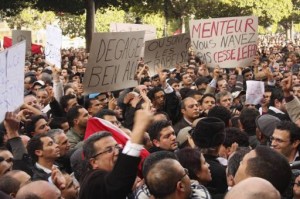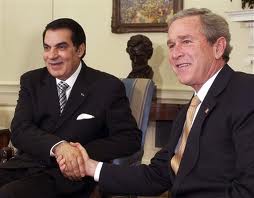[Author’s note: The following commentary was originally published on Tuesday, January 25, at 5:53 am. I have decided to reprise it because the protests the Tunisian revolution triggered across the Middle East will likely reach a tipping point today. I have also appended an update based on recent developments in Tunisia.]
 Eleven days ago, Tunisian President Zine al-Abidine Ben Ali fled the country with his immediate family in tow.
Eleven days ago, Tunisian President Zine al-Abidine Ben Ali fled the country with his immediate family in tow.
He did so to escape what he no doubt feared would be a repeat of the 10 days of mass protests in 1989, which led to the summary execution of Romanian President Nicolae Ceausescu and his wife Elena.
Then, as now, the protests began innocuously enough: In Romania, the harassment of a lowly dissident priest ignited nation-wide protests over the lack of everything from basic food supplies to basic human rights. In Tunisia, that spark was a poor fruit vendor named Mohamed Bouazizi setting himself on fire in frustration, despair, and utter humiliation. This, after a local official not only took away the scale he needed to sell his fruits, but slapped him in the face when he refused to pay the customary bribe to get it back.
But in both cases, it was the killing of a protester by local riot police, as well as rumors about the killing of dozens more, that incited their revolutionary fervor.
Of course, Tunisian protesters might have also derived inspiration from so-called people revolutions that ousted totalitarian regimes in places like Czechoslovakia (the Velvet Revolution) and Ukraine (the Orange Revolution).
But, given the way Iran brazenly squashed similar protests (dubbed the Green Revolution) in 2009, it took commendable courage for Tunisian protesters to remain vigilant in the face of an attempted crackdown.
In fact, these protesters have become inexorable in their determination to purge their country of anyone who was even remotely associated with Ben Ali’s regime; indeed, so much so that the police – who were defending the interim government just last week – are now locking arms with them.
Thus far they have shunned all efforts to placate them, including offers to release all political prisoners, pay compensation to those persecuted by the old regime, and hold democratic elections within six months.
The interim government has even made quite a show of rounding up all of Ben Ali’s family members who did not manage to escape. But this hardly compares to the vigilante justice protesters have already executed on their vast property holdings throughout the country.
It seems calm will only be restored once protesters – now being led by trade-union bosses and opposition leaders returning from exile – are satisfied that their “national salvation government” is completely Ben-Ali free.
 It’s worth noting, though, that Ben Ali was that rare Muslim leader who was doing in the open what other Muslim leaders were doing on the down low; namely, helping the United States fight its amorphous war on terror.
It’s worth noting, though, that Ben Ali was that rare Muslim leader who was doing in the open what other Muslim leaders were doing on the down low; namely, helping the United States fight its amorphous war on terror.
Therefore, U.S. authorities must be wondering what this revolution portends in this respect. They should be reassured, however, that Tunisia is not just among the most secular of Muslim states, but has aggressively routed out the types of Islamists who are now threatening its alliance with countries like Yemen.
Actually, all indications are that the democratic freedom fighters behind Tunisia’s “Tweet Revolution” might prove even more worthy as allies than the autocratic Ben Ali. Albeit, ironically, this also means that a democratic government might, indeed should, be less inclined to torture and rendition terror suspects at Washington’s behest the way Ben Ali did.
 Meanwhile, apropos of inspiration, folks are setting themselves on fire all over the Muslim world in an attempt to spark similar mass protests. And this revolutionary fire is catching on, especially in places like Algeria, Egypt, and Yemen where protesters are defying government bans on public gatherings to demand new leadership, democratic freedoms and an end to corruption.
Meanwhile, apropos of inspiration, folks are setting themselves on fire all over the Muslim world in an attempt to spark similar mass protests. And this revolutionary fire is catching on, especially in places like Algeria, Egypt, and Yemen where protesters are defying government bans on public gatherings to demand new leadership, democratic freedoms and an end to corruption.
For 60 years, my country, the United States, pursued stability at the expense of democracy in this region – and we achieved neither. Now, we are taking a different course. We are supporting the democratic aspirations of all people.
U.S. Secretary of State Condoleezza Rice announced this revolutionary change in U.S. foreign policy toward the Middle East at the American University in Cairo on June 20, 2005. And it’s arguable that this change is what ignited the spark that has led to the revolutionary fires now burning all over the region.
Incidentally, I am not like so many political commentators now jumping on this revolutionary bandwagon. For here is how I criticized the lack of democratic freedoms in this region, in Egypt in this case, long before U.S. government officials and media organizations saw the light:
Western leaders still consider Egyptian President Hosni Mubarak a pioneer for democracy in the Arab world – despite the fact that during his 25 years in power he never allowed a single candidate to oppose his “re-election” as president…
International media hardly reported that political dissident Ayman Nour’s imprisonment confirmed Egypt’s notorious retreat from the path toward democracy, which Mubarak promised his American benefactors he would follow. Not to mention that the U.S. government has given this zealously pro-American tyrant almost $50 billion during his 25-year reign. But Mubarak has been repaying this debt lately by extracting information from renditioned prisoners the Americans were too squeamish to “interrogate”.
(Political dissidents doing hard time in political vacuum, The iPINIONS Journal, December 30, 2005)
Unfortunately, U.S. entanglements across this region remain so fraught with double standards and conflicts of interest that it is in no position to provide any more than moral support to these protesters. In the meantime, it’s the Iranian precedent that seems to be taking hold elsewhere – as police and security forces are being unsympathetic and unsparing in their crackdown. And in this vein, I am mindful that daily anti-government protests persisted in Iran to no avail for over six months, during which over 70 protesters were killed.
Indeed, I fear the only lesson other de facto dictators (like President Hosni Mubarak of Egypt) will learn from Tunisia is this:
Better to share more of the loot from the national treasury with the security forces who protect you than allow the people you oppress to think that mass protests would be sufficient to oust you too.
Only God knows how all of these protests will turn out. All the same, I stand in virtual solidarity with all those who dare to sound the clarion call of American revolutionary hero Patrick Henry:
Give me liberty or give me death!
UPDATE
Arrest warrant issued for deposed president
Leaders of Tunisia’s interim government issued international arrest warrants earlier this week for Ben Ali and his family members-evidently determined to show that they harbor no lingering loyalties.
These warrants also request the freezing of all foreign bank accounts they may have. As it happens, though, they flew the coop with hundreds of millions of dollars in cash too….
Reports are that Ben Ali fled to Saudi Arabia, which puts this country’s ruling royal family in somewhat of a bind:
-
Do they betray a fellow Muslim dictator by handing him over?
-
Do they ignore the warrants and risk sympathetic uprisings at home?
-
Or do they prevail upon Ben Ali to seek refuge in a country like China or Iran that would have no compunction about harboring him, or in Sudan where he and that country’s Muslim dictator, President Omar al Bashir, himself facing an international arrest warrant, could commiserate over their fugitive status?
I suspect the Saudis will opt for this third option. Nobody is going to arrest Ben Ali.
Related commentaries:
Revolution in the Middle East
Political dissidents doing hard time
Leave a Reply
You must be logged in to post a comment.